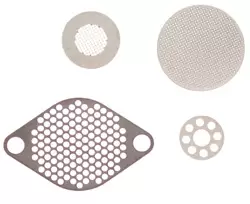Perforated Metal
Chemical Etching Produces Burr-free Holes of Any Shape

- Holes as small as .004″ (see conditions)
- Minimum hole size >= to 110% of metal thickness
- Minimum ligature between holes >= to metal thickness
Chemical Etching Paneled Continuous Screens

Photochemical etching is an ideal process for perforated metal products, such as:
- Grids
- Screens
- Meshes
- Filters
- Separators
- Microfilters
- Grilles
- Lighting diffusers and more
Unlike mechanical perforating methods such as punching, stamping or laser cutting, photochemical machining of metal leaves the material free of burrs and induced mechanical or thermal stress or deformation.


